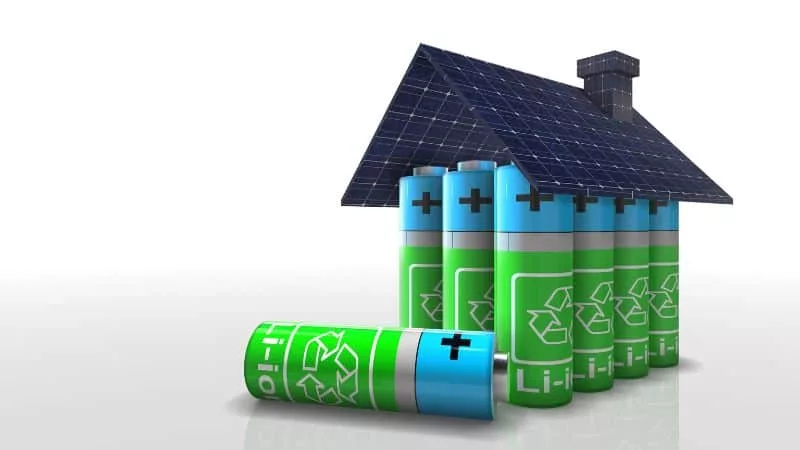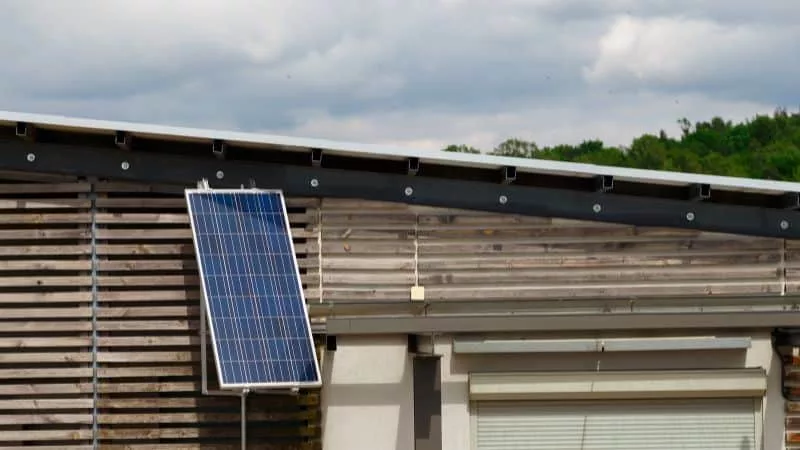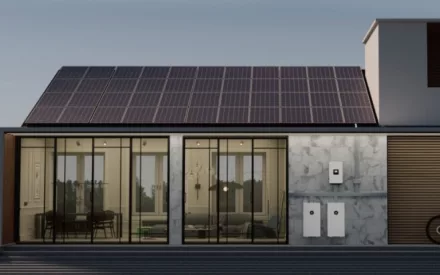How Long Do Solar Batteries Last? Understanding The Lifespan

When exploring renewable energy solutions for your home, you may consider how long the components of these systems, particularly solar batteries, will last. Solar batteries are essential to store the energy harnessed by your solar panels, allowing you to maintain a consistent power supply during nighttime or cloudy days. The lifespan of solar batteries is a significant factor to consider, as it determines when a replacement might be needed and impacts the overall cost-effectiveness of your solar energy system.
How long your solar battery will last? The durability and longevity of solar batteries vary depending on several factors. These include not only the type and quality of the battery but also your energy usage patterns, the frequency and depth of charge cycles, and the environmental conditions in which the battery operates. Solar batteries, such as deep-cycle varieties, are designed to sustain repeated charge and discharge cycles, which is central to optimizing their performance and extending their lifespan. Moreover, understanding the warranties offered with solar batteries can help ensure that your investment is protected.
Key Takeaways
Based on the search results, solar batteries generally last between 5 to 15 years, with lithium-ion batteries being the most common type used in home solar battery systems.
The key factors that impact solar battery lifespan include:
- Battery type: Lithium-ion batteries typically last 10-15 years. Lead-acid batteries last 3-5 years. Newer saltwater batteries likely last somewhere in between.
- Depth of discharge (DoD): Exceeding the recommended DoD for a battery severely reduces its lifespan. Lithium-ion batteries commonly have a 90%+ DoD rating.
- Usage/cycles: More cycles and usage drain batteries faster. Solar-paired systems that rarely use batteries may get 10-15 year lifespans, while off-grid systems using them daily may only get 5 years.
- Temperature: Extreme heat or cold degrades batteries faster.
- Maintenance: Proper cleaning and maintenance extends battery life.
In comparison, solar panels themselves often last 20-30 years, so most homeowners need to replace batteries at least once within their system’s lifespan. Overall battery lifespan varies greatly depending on the above factors, with lithium-ion batteries generally lasting the longest of common options.
Understanding Solar Batteries
Your journey into solar energy isn’t complete without understanding how solar batteries store the renewable power you generate. These storage solutions are pivotal for maintaining energy independence and ensuring you have power when the sun isn’t shining.
Basics of Solar Energy Storage
Solar batteries work by storing excess solar energy produced during sunny periods, so you have electricity available at night or during cloudy weather. Think of solar batteries as a reservoir of power; they fill up when there’s a surplus and provide energy when your panels aren’t producing. The efficiency and longevity of this process depend largely on the type of battery you choose and how well you maintain it.
- Capacity: This measures the total amount of electricity that a battery can store, often indicated in kilowatt-hours (kWh).
- Depth of Discharge (DoD): This is the percentage of the battery’s capacity that has been used. Batteries with a higher DoD have a longer usable lifespan.
- Cycle Life: This refers to the number of charge and discharge cycles a battery can provide before reaching a specific degree of capacity degradation.
Types of Solar Batteries
Different solar battery types come with their own sets of pros and cons, directly impacting system performance, maintenance requirements, and overall lifespan.
- Lead-Acid Batteries: These are the traditional choice for off-grid energy systems, known for being economical but have a shorter lifespan and require regular maintenance.
- Pros: Lower cost, tried and tested technology
- Cons: Lower DoD, requires more space, frequent maintenance
- Lithium-Ion Batteries: A more modern option, lithium-ion batteries are popular due to their higher efficiency and longer life.
- Pros: Higher DoD, longer lifespan, minimal maintenance, compact
- Cons: Higher initial cost, complex manufacturing
- Saltwater Batteries: As an emerging technology, saltwater batteries offer an environmentally friendly option, using a saltwater electrolyte rather than heavy metals.
- Pros: Eco-friendly, safer disposal, no heavy metals
- Cons: Newer on the market, less proven over long-term use
When considering a battery for your solar panel system, it’s essential to weigh factors like upfront costs, maintenance requirements, lifespan, and the DoD. Your choice impacts not just the system’s efficiency but also how often you might need to replace batteries over the life of your solar energy system.
Factors Affecting Battery Lifespan

The lifespan of your solar battery can be significantly influenced by a few critical factors. Understanding and managing these can help you safeguard the long-term health and efficiency of your battery.
Temperature and Environmental Conditions
Your solar battery’s surroundings play an important role in its operational health. Batteries exposed to extreme temperatures outside their optimal working range may experience decreased performance and longevity. For instance, while lithium-ion batteries function efficiently within a broad temperature range, consistently operating in environments hotter than 50°C or colder than 0°C could lead to gradual degradation.
- Ideal storage: Aim for a consistent, temperature-controlled environment, like a garage or sheltered outdoor area.
- Temperature ranges: Maintain within a battery’s specified temperature range to avoid strain and prolong life.
Depth of Discharge and Battery Usage
The depth of discharge (DoD) refers to how much of a battery’s capacity is utilized before it is recharged. Typically, a higher DoD means more strain on the battery, reducing its lifespan. For example, if your battery’s DoD is 90% and its total capacity is 13 kWh, you should aim to use no more than 11.7 kWh before recharging to avoid early degradation.
- Optimal DoD: Keep your usage within the recommended DoD percentage to maximize lifespan.
- Awareness: Modern systems may have safeguards to prevent using the battery’s full capacity, protecting its longevity.
Maintenance and Care Practices
Maintaining your solar battery doesn’t require heavy labor, but a few good practices can considerably extend its life.
- Monitoring: Regularly check your battery’s performance, either through an app or a scheduled inspection, to catch and address issues early.
- Cleanliness: Ensure the battery’s environment is clean and free from dust and debris.
- Maintenance plan: Consider a maintenance plan, if available, for professional oversight and peace of mind.
Keep these tips in mind to help ensure your solar battery operates effectively for as long as possible.
What are Deep Cycle Batteries?
Deep cycle batteries are a key component in renewable energy storage systems, like those you’d use with your solar panels. Unlike regular car batteries, which provide short bursts of energy to start an engine, deep-cycle batteries are designed to provide a steady amount of power over a long period. They’re constructed to withstand repeated charge and discharge cycles, making them an ideal choice for your solar energy needs.
Key Characteristics:
- Deep Discharge: Deep cycle batteries can be discharged up to 80% of their capacity without causing significant damage, whereas regular batteries should not be discharged more than 50%.
- Durability: They are built to endure the cycle of charging and recharging many times, often thousands of cycles over several years.
- Types: You’ll come across different types of deep-cycle batteries, such as:
- Lead-acid: More affordable but a shorter lifespan of around 3-5 years.
- Lithium-ion: More expensive upfront, but can last between 10-15 years and often have a higher depth of discharge.
Usage:
- Recreational Vehicles (RVs): Deep cycle batteries are commonly used in RVs for storing solar power.
- Solar Storage: They pair well with solar setups to replace traditional generators, offering you a quieter, cleaner source of energy.
When selecting a deep-cycle battery, it’s important to consider factors like your budget, the intended use, and the expected lifespan. With the right care and usage, a quality deep-cycle battery will serve as a reliable component in your solar energy system, ensuring you have power when you need it.
Battery Life Expectancy

When considering a solar battery for your system, knowing how long it can hold up under regular use is crucial. Battery lifespan varies widely based on the type of battery you choose and its manufacturer’s quality standards.
Life Expectancy of Different Battery Types
The type of solar battery you select plays a significant role in its life expectancy. Here’s a quick breakdown:
- Lead-Acid Battery: This seasoned technology offers a lifespan of typically 3-5 years. Lead-acid batteries are known for their low cost but also have a shorter life cycle of around 500-1600 cycles.
- Lithium-ion Battery: A more modern choice, lithium-ion batteries boast a longer lifespan ranging generally between 5 and 15 years.
- Lithium Iron Phosphate (LFP): Known for stability and longevity, LFP batteries can last up to 10 years or more.
- Lithium Nickel Manganese Cobalt Oxide (NMC): Common in electric vehicles, NMC batteries offer a good balance of power and longevity, often falling within the 5 to 15-year range.
Importance of Quality and Manufacturer
The lifespan of your solar battery is not just about the type; it’s also about the quality and the manufacturer. Batteries from reputable manufacturers often have longer warranties and are more likely to reach or exceed their expected lifespans. High-quality materials and manufacturing processes mean these batteries can better withstand the repeat charge and discharge cycles they will endure throughout their lives.
Optimizing Battery Performance
To ensure your solar panel batteries last as long as possible, focusing on correct installation and smart energy management is key. These elements not only extend battery life but also maintain performance.
Proper Installation and Setup
Your solar battery’s longevity starts with proper installation. It’s essential that you position your batteries in a temperature-controlled environment, within a range of 60-70°F (16-21°C), to prevent damage from extreme temperatures. Make certain that all components are installed correctly—including the charge controller, which regulates overcharging and ensures battery safety. Here’s what to check during installation:
- Battery placement: Secure in a stable, clean, and dry location.
- Wiring: Ensure that all connections are tight and corrosion-free.
- Ventilation: Adequate airflow around the batteries to dispel heat.
Smart Charging and Usage
Effective battery maintenance involves smart charging techniques and monitoring usage patterns. Aim to use your batteries within their optimal consumption range—not draining them completely nor keeping them constantly full:
- Charge Controller: Utilize a modern charge controller to prevent overcharging and to manage power flow, which can help extend battery life.
- Maintenance Practices: Regularly inspect your battery and clean terminals to prevent build-up and poor conductivity.
- Usage Patterns: Understand your energy consumption and adjust accordingly to avoid unnecessary strain on the battery.
By adhering to these guidelines, you can maximize your solar batteries’ performance and lifespan.
Solar Batteries and Power Reliability
Solar batteries enhance your home’s energy resilience by providing reliable backup power and contributing to a sustainable energy future. They are instrumental in maintaining electricity supply during grid outages and are a tangible step towards cleaner energy.
Backup Power During Outages
During a power outage, your solar batteries take center stage by ensuring that your home retains access to electricity. Typically configured to kick in automatically when the grid goes down, these batteries allow you to maintain essential functions without interruption.
- Essential electronics like refrigerators, lights, and medical devices continue to operate.
- Avoid the inconvenience and potential costs associated with grid outages.
Lifespan factors:
- Full cycles (a full charge and discharge) influence battery longevity, impacting how frequently you may need a replacement.
- Proper maintenance and usage within recommended parameters can extend lifespan beyond the typical 5 to 15 years.
The Importance of Warranty
When you’re considering the purchase of a solar battery, it’s essential to evaluate the warranties offered. Warranties serve as a promise from the manufacturer to support the product over a specified period. Here’s what to look for:
Product Warranty:
This covers defects in the battery itself and generally spans 10 to 12 years. Make sure the warranty covers not just parts but associated labor and shipping costs, which may be a bonus.
Performance Warranty:
A performance warranty assures that the battery will maintain a minimum capacity over time, usually guaranteeing 70% capacity after 10 to 15 years.
Throughput Warranty:
Batteries also come with a throughput warranty, which is measured in megawatt-hours (MWh). For example, a 12-year warranty with 43 MWh of throughput means the battery should handle this amount of energy delivery over its warranty period.
Checklist for Your Solar Battery Warranty:
- Duration: Is the duration of the warranty in line with, or preferably longer than, the industry standards of 10 to 12 years for product warranty and 10 to 15 years for performance warranty?
- Coverage: Does the warranty cover manufacturing defects, and will it support a significant portion of the battery’s capacity over time?
- Transferability: If you sell your home, does the warranty transfer to the new owner? This can add value to your property.
Remember, a robust warranty can help protect your investment and save on potential future costs associated with battery repair or replacement.




